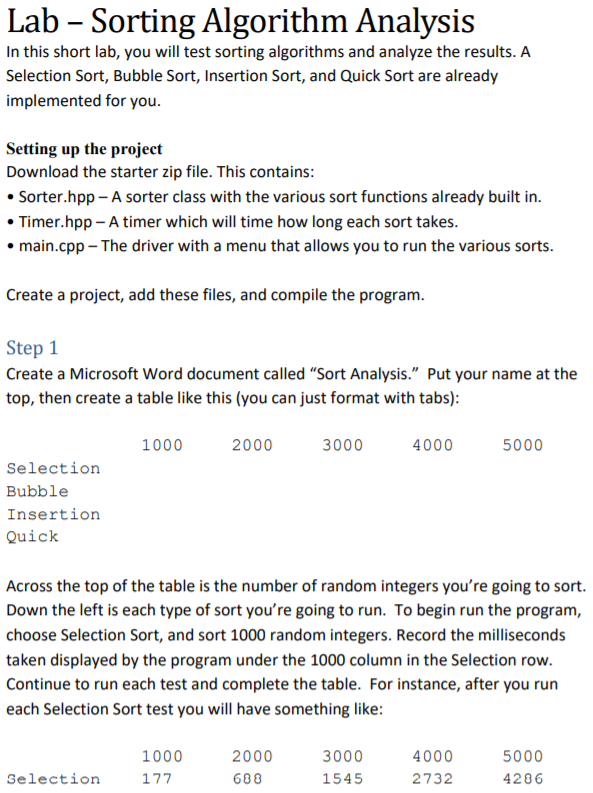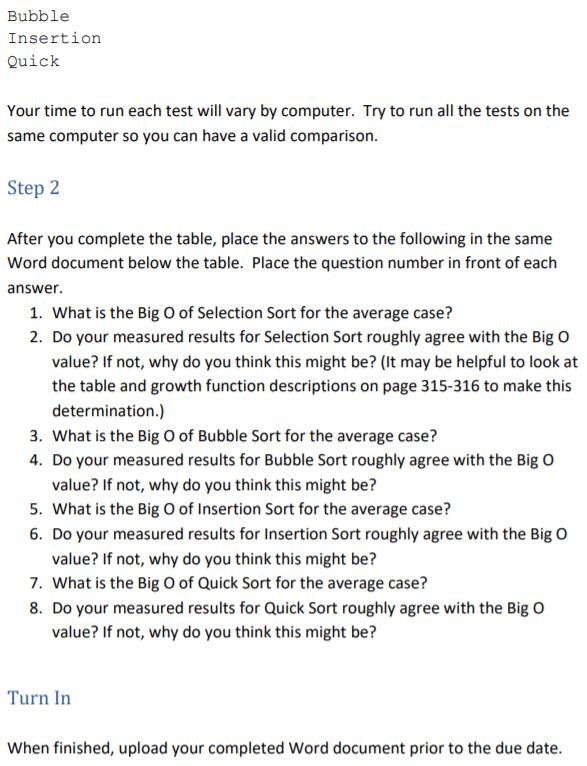Question
Could someone please help me with this C++ program that covers Sorting Algorthim Analysis? The instructions are posted in the images below, and the 3
Could someone please help me with this C++ program that covers Sorting Algorthim Analysis? The instructions are posted in the images below, and the 3 starting code files are pasted in text below (main.cpp, Sorter.hpp, Timer.hpp)
MAIN.CPP____________________________________________________________________________
#include
using namespace std;
#include "Sorter.hpp"
// displays menu and returns valid option
int displayMenu();
// pause for a key the clear screen
void pause();
int main()
{
int listSize = 10;
int choice = 0;
do
{
choice = displayMenu();
if (choice != 5)
{
do
{
cout
cin >> listSize;
if (listSize
cout
} while (listSize
system("cls");
Sorter* sorterPtr = new Sorter(listSize);
sorterPtr->doSort(choice);
delete sorterPtr;
pause();
}
} while (choice != 5);
return 0;
}
int displayMenu()
{
int choice = 0;
cout
do
{
cin >> choice;
if (choice 5)
cout
} while (choice 5);
return choice;
}
void pause()
{
cout
cin.ignore();
cin.get();
system("cls");
}
SORTER.HPP____________________________________________________________________________
#ifndef _SORTER_HPP
#define _SORTER_HPP
#include "Timer.hpp"
using namespace std;
#include
#include
#include
int findIndexOfSmallest(const vector
int partition(vector
int sortFirstMiddleLast(vector
void order(vector
class Sorter
{
public:
Sorter(int arraySize);
vector
vector
vector
vector
void Run(int type);
void doSort(int choice);
private:
vector
bool m_listSorted;
};
Sorter::Sorter(int arraySize)
{
srand(time(0));
for (int i = 0; i
{
m_array.push_back(rand() % 10000);
}
m_listSorted = false;
}
void Sorter::doSort(int choice)
{
Timer timer;
timer.Start();
switch(choice)
{
case 1:
cout
m_array = selectionSort(m_array);
break;
case 2:
cout
m_array = bubbleSort(m_array);
break;
case 3:
cout
m_array = insertionSort(m_array);
break;
case 4:
cout
m_array = quickSort(m_array,0, m_array.size() - 1);
break;
default:
cout
}
m_listSorted = true;
cout
cout
for (int i = 0; i
{
cout
}
cout
for (int i = m_array.size() - 5; i
{
cout
}
cout
}
vector
{
// Bubble Sort
vector
unsigned int n = sorted.size();
for (unsigned int i = 0; i
{
for (unsigned int j = 0; j
{
if (sorted[j] > sorted[j + 1])
{
int temp = sorted[j];
sorted[j] = sorted[j + 1];
sorted[j + 1] = temp;
}
}
}
return sorted;
}
vector
{
vector
int temp;
for (int front = 0; front
{
int smallest = findIndexOfSmallest(sorted, front);
std::swap(sorted[front], sorted[smallest]);
}
return sorted;
}
vector
{
vector
unsigned int n = sorted.size();
for (int unsorted = 1; unsorted
{
int nextItem = sorted[unsorted];
int loc = unsorted;
while ((loc > 0) && (sorted[loc - 1] > nextItem))
{
// Shift sorted[loc - 1] to the right
sorted[loc] = sorted[loc - 1];
loc--;
} // end while
sorted[loc] = nextItem; // Insert nextItem into sorted region
} // end for
return sorted;
}
vector
{
// the smallest array quickSort will sort
if (last - first + 1
{
theArray = insertionSort(theArray);
}
else
{
// Create the partition: S1 | Pivot | S2
int pivotIndex = partition(theArray, first, last);
// Sort subarrays S1 and S2
quickSort(theArray, first, pivotIndex - 1);
quickSort(theArray, pivotIndex + 1, last);
} // end if
return theArray;
} // end quickSort
int findIndexOfSmallest(const vector
{
int smallestFound = start; // Index of smallest entry found so far
for (int currentIndex = start+1; currentIndex
{
if (arr[currentIndex]
smallestFound = currentIndex;
} // end for
return smallestFound; // Index of smallest entry
} // end findIndexOfSmallest
int partition(vector
{
// Choose pivot using median-of-three selection
int pivotIndex = sortFirstMiddleLast(theArray, first, last);
// Reposition pivot so it is last in the array
std::swap(theArray[pivotIndex], theArray[last - 1]);
pivotIndex = last - 1;
int pivot = theArray[pivotIndex];
// Determine the regions S1 and S2
int indexFromLeft = first + 1;
int indexFromRight = last - 2;
bool done = false;
while (!done)
{
// Locate first entry on left that is >= pivot
while (theArray[indexFromLeft]
indexFromLeft = indexFromLeft + 1;
// Locate first entry on right that is
while (theArray[indexFromRight] > pivot)
indexFromRight = indexFromRight - 1;
if (indexFromLeft
{
std::swap(theArray[indexFromLeft], theArray[indexFromRight]);
indexFromLeft = indexFromLeft + 1;
indexFromRight = indexFromRight - 1;
}
else
done = true;
} // end while
// Place pivot in proper position between S1 and S2, and mark its new location
std::swap(theArray[pivotIndex], theArray[indexFromLeft]);
pivotIndex = indexFromLeft;
return pivotIndex;
} // end partition
int sortFirstMiddleLast(vector
{
int mid = first + (last - first) / 2;
order(theArray, first, mid); // Make theArray[first]
order(theArray, mid, last); // Make theArray[mid]
order(theArray, first, mid); // Make theArray[first]
return mid;
} // end sortFirstMiddleLast
void order(vector
{
if (theArray[i] > theArray[j])
std::swap(theArray[i], theArray[j]); // Exchange entries
} // end order
#endif
TIMER.HPP____________________________________________________________________________
#ifndef TIMER_HPP #define TIMER_HPP
#include
class Timer { public: void Start() { m_startTime = chrono::system_clock::now(); }
unsigned int GetElapsedSeconds() { auto current_time = std::chrono::system_clock::now(); return chrono::duration_cast<:chrono::seconds>( current_time - m_startTime ).count(); }
unsigned int GetElapsedMilliseconds() { auto current_time = std::chrono::system_clock::now(); return chrono::duration_cast<:chrono::milliseconds>( current_time - m_startTime ).count(); }
private: chrono::system_clock::time_point m_startTime; };
#endif


Step by Step Solution
There are 3 Steps involved in it
Step: 1

Get Instant Access to Expert-Tailored Solutions
See step-by-step solutions with expert insights and AI powered tools for academic success
Step: 2

Step: 3

Ace Your Homework with AI
Get the answers you need in no time with our AI-driven, step-by-step assistance
Get Started


